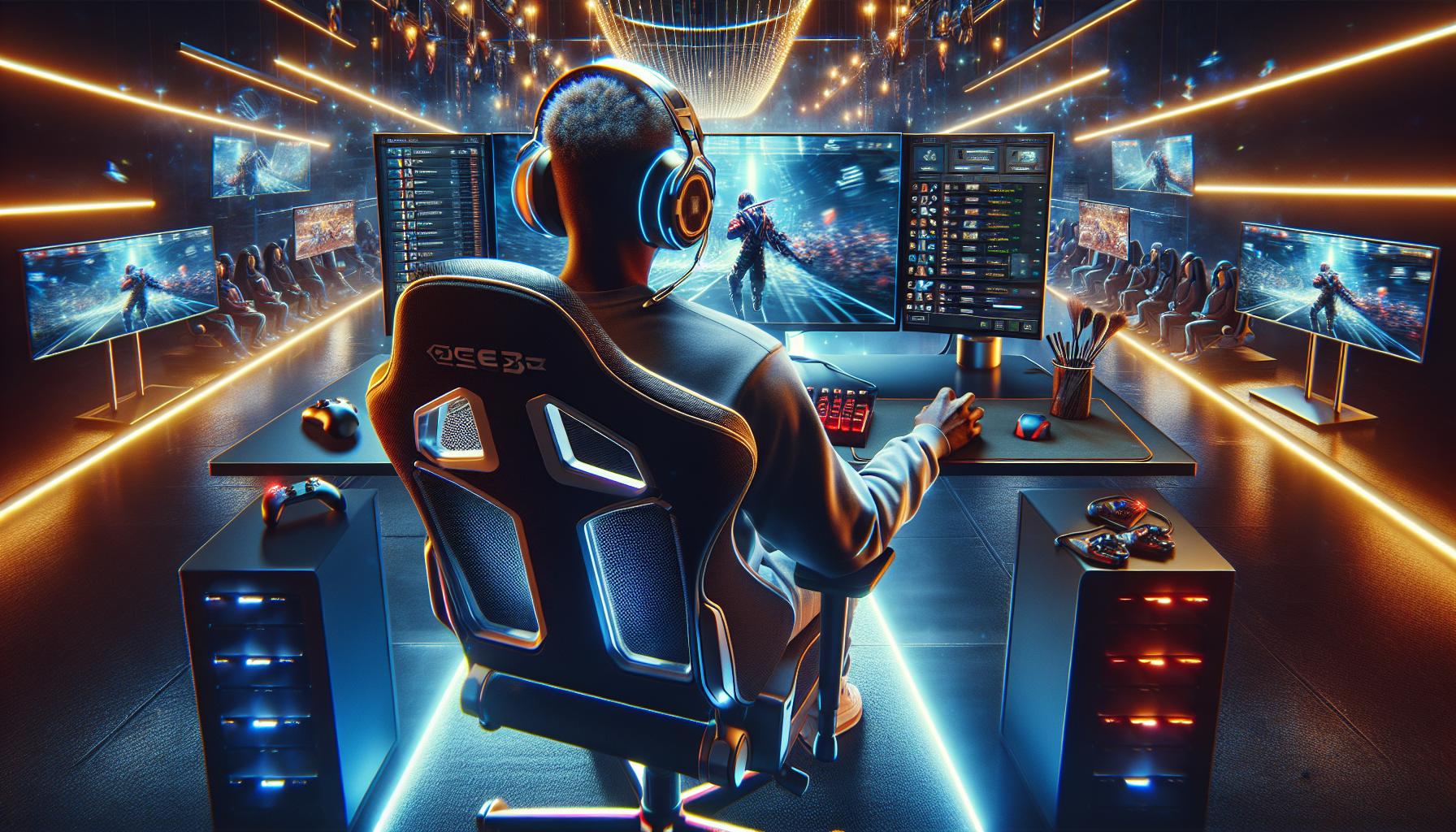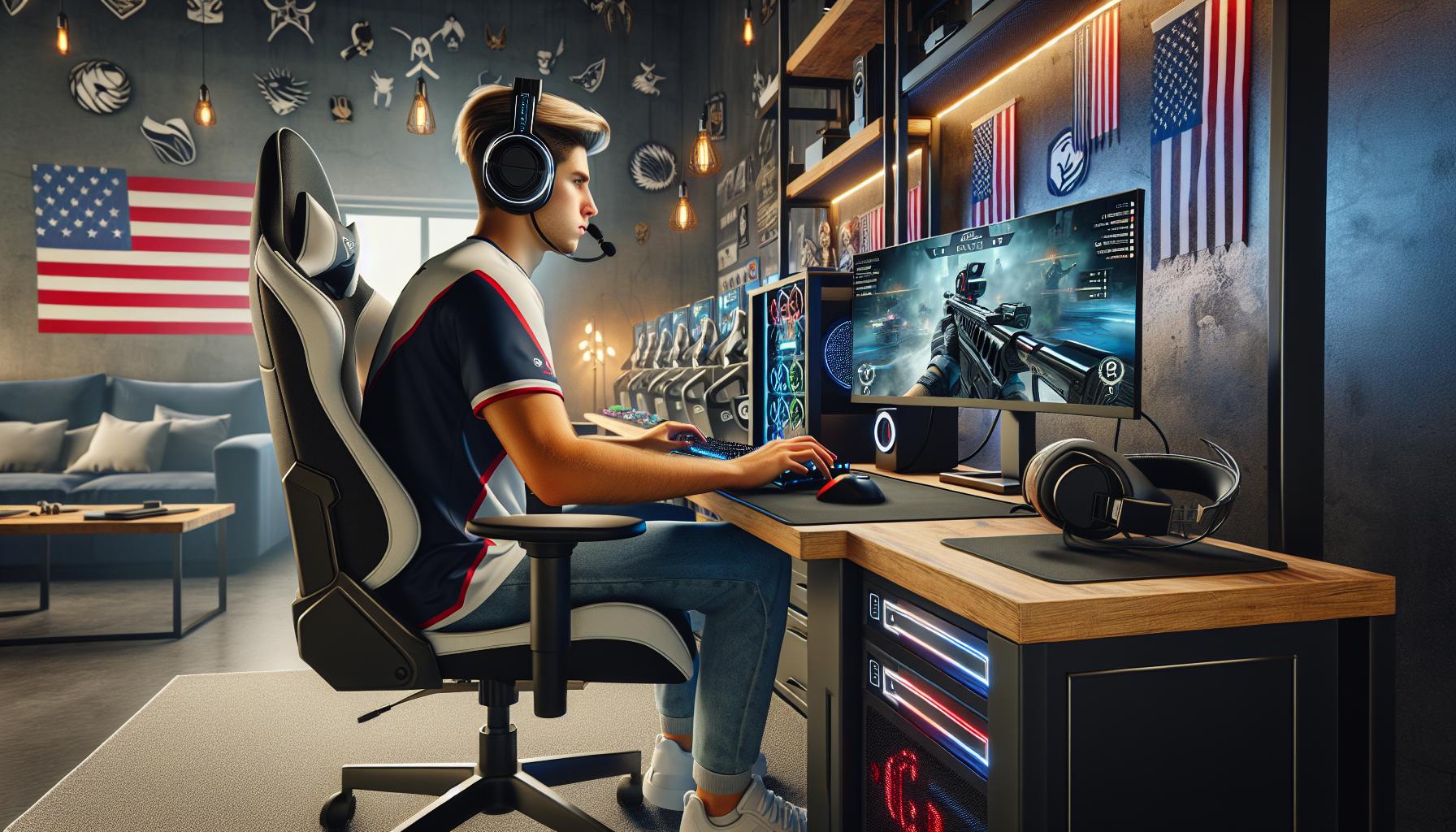Phone:
(701)814-6992
Physical address:
6296 Donnelly Plaza
Ratkeville, Bahamas.

Ever imagine battling it out in virtual arenas with the same intensity as a championship football game? Esports has skyrocketed, captivating millions worldwide and challenging traditional notions of what defines a sport. But does competing on a screen earn its rightful place alongside physical athletics?
From strategic masterminds to lightning-fast reflexes, esports athletes train rigorously, pushing their skills to the limit just like their counterparts on the field. The adrenaline of high-stakes tournaments and the camaraderie of team play blur the lines between digital and physical competition.
As the debate heats up, it’s clear that esports are more than just games—they’re a dynamic and evolving frontier in the world of sports. Dive in to discover why esports might just deserve the title of “real” sports.
Sports encompass organized physical activities involving skill, competition, and adherence to specific rules. Traditional sports like football, basketball, and athletics require physical prowess, strategic thinking, and teamwork. Participants engage in training regimens to enhance their abilities, striving for peak performance during competitions.
Esports, short for electronic sports, refer to competitive video gaming at a professional level. Games such as League of Legends, Dota 2, and Counter-Strike demand strategic planning, quick reflexes, and coordinated team efforts. Players dedicate extensive hours to practice, developing skills and mastering game mechanics to excel in tournaments.
Both sports and esports share key elements like structured competition, skill development, and spectator engagement. Traditional sports emphasize physical endurance and dexterity, while esports focus on mental agility and precision. Recognition from governing bodies, professional leagues, and global audiences further solidifies esports’ position alongside conventional sports.
Examining foundational aspects of sports, including competition, skill, and organization, esports exhibit parallel characteristics that support their classification as legitimate sports. The evolving definition of sports now embraces activities prioritizing mental and strategic capabilities alongside physical attributes.

Esports require significant physical and mental effort from athletes. Both aspects are crucial for peak performance in competitive gaming.
Esports athletes engage in various physical activities to maintain their health and enhance performance. Regular exercise routines include cardiovascular workouts, strength training, and flexibility exercises. These activities prevent repetitive strain injuries and reduce fatigue during long gaming sessions. Proper ergonomics are essential; players use specialized chairs and desk setups to support posture. Hand-eye coordination improves through consistent practice, increasing reaction times and precision. Additionally, maintaining eye health with regular breaks and proper lighting minimizes strain. Nutrition also plays a role; balanced diets help sustain energy levels and cognitive function. Sleep management strategies ensure athletes remain alert and focused. Physical training schedules often mirror traditional sports, highlighting the importance of fitness in esports success. By prioritizing physical well-being, esports athletes enhance their overall gaming performance and longevity in the competitive arena.
Esports demand advanced cognitive skills to excel in high-pressure environments. Strategic thinking enables players to anticipate opponents’ moves and make informed decisions quickly. Rapid decision-making is essential during fast-paced matches, where split-second choices can determine victory or defeat. Memory retention helps in recalling game mechanics, maps, and opponent behaviors. Attention to detail allows players to notice subtle changes and exploit weaknesses effectively. Multitasking skills enable handling multiple objectives simultaneously without loss of focus. Adaptability ensures athletes can adjust strategies in response to evolving gameplay dynamics. Problem-solving abilities facilitate overcoming in-game challenges and unexpected situations. Team coordination relies on clear communication and understanding among members. Continuous mental training, including focus exercises and cognitive drills, enhances these skills. By developing strong cognitive abilities, esports athletes maintain a competitive edge and achieve high levels of performance.
Esports feature a well-defined competitive framework, similar to traditional sports. Organized tournaments and leagues provide structure and opportunities for athletes to compete at various levels.
Esports tournaments attract millions of viewers and offer substantial prize pools. The annual League of Legends World Championship generates over $2 million in prizes. Similarly, The International for Dota 2 exceeds $40 million annually. These events include group stages, playoffs, and finals, ensuring a competitive environment. Major leagues like the Overwatch League and Call of Duty League operate regular seasons with franchised teams. Team-based competitions emphasize strategy and coordination, while individual tournaments highlight personal skill and performance. Sponsorships and broadcasting rights support the financial viability of these competitions. Additionally, regional leagues facilitate talent development and local fan engagement, promoting the growth and sustainability of esports as a competitive discipline.
Esports steadily gain recognition from established sports organizations. In 2020, the International Olympic Committee formed an esports working group to evaluate potential Olympic inclusion, marking a significant step toward mainstream acceptance. Additionally, traditional sports leagues like the NBA and NFL invest in esports teams, demonstrating a blend of conventional and electronic sports.
Educational institutions embrace esports by offering scholarships and creating dedicated programs. Over 200 U.S. colleges support varsity esports teams, integrating academic pursuits with competitive gaming. This academic endorsement highlights esports’ legitimacy and fosters talent development.
Major multi-sport events feature esports, further validating their status. The Asian Games 2022 included esports as a demonstration sport, attracting millions of viewers and emphasizing their competitive nature. Such inclusion showcases esports alongside traditional athletic events, enhancing their credibility.
Sponsorship and media coverage drive esports’ commercial growth. Global brands like Coca-Cola and Intel sponsor key tournaments, reflecting confidence in the industry’s expansion. Media platforms, including Twitch and YouTube, secure exclusive broadcasting rights for esports events, increasing visibility and accessibility for diverse audiences.
Public acceptance mirrors the rise in media presence. Surveys reveal that 60% of sports fans recognize esports as legitimate sports, influenced by their strategic complexity and competitive intensity. Professional esports athletes achieve celebrity status, similar to traditional sports figures, reinforcing their prominence.
Governance and regulation align esports with established sports standards. Esports federations implement standardized rules, anti-doping measures, and fair play protocols, ensuring integrity and consistency. These regulatory frameworks parallel those in conventional sports, reinforcing esports’ legitimacy.
Corporate investment and infrastructure development support esports’ growth. Dedicated arenas, training facilities, and advanced technology enhance the competitive environment, attracting both players and fans. This infrastructure mirrors that of traditional sports, providing a solid foundation for sustained recognition.
Overall, the growing recognition and acceptance of esports by sports organizations, educational institutions, sponsors, and the public confirm their status as real sports. This widespread legitimacy positions esports alongside traditional athletics in the global sports arena.
Esports have firmly established themselves as legitimate competitive arenas through rigorous training and strategic thinking. The dedication of esports athletes mirrors that of traditional sports figures showcasing both mental and physical prowess. With growing institutional support and increasing public acceptance esports continue to bridge the gap between electronic and conventional sports. Major tournaments and sponsorships highlight their significance in the global sports landscape. As the landscape evolves it’s clear that esports hold their ground alongside traditional athletics shaping the future of competitive entertainment.